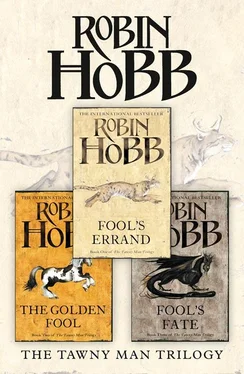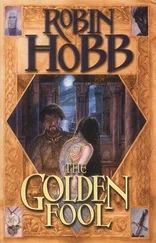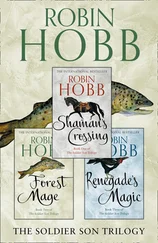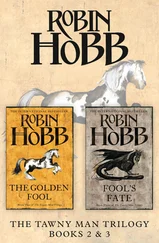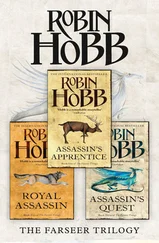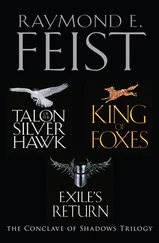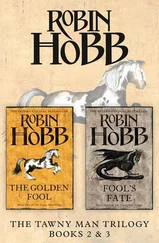The Fool got up and paced the room restlessly. He went from door to hearth to window twice, and then diverted to the cupboard. He brought the brandy and two cups back to the table. It seemed as good an idea as any. I watched him pour.
I know we drank that evening and well into the night. The Fool took over the talking. I think he tried to be amusing and lighten my mood, but his own spirits seemed as damped as mine. From anecdotes of the Bingtown Traders, he launched into a wild tale of sea-serpents that entered cocoons to emerge as dragons. When I demanded to know why I had not seen any of these dragons, he shook his head. ‘Stunted,’ he said sadly. ‘They emerged in the late spring, weak and thin, like kittens born too soon. They may yet grow to greatness, but for now the poor creatures feel shamed at their frailty. They cannot even hunt for themselves.’ I well recall his look of wide-eyed guilt. His golden eyes bored into me. ‘Could it be my fault?’ he asked softly, senselessly at the end of his tale. ‘Did I attach myself to the wrong person?’ Then he filled his glass again and drank it down with a purposefulness that reminded me of Burrich in one of his black moods.
I don’t remember going to bed that night, but I do recall lying there, my arm flung across the sleeping wolf, drowsily watching the Fool. He had taken out a funny little instrument that had but three strings. He sat before the fire and strummed it, plucking discordant notes that he smoothed with the words of a sad song in a language I had never heard. I set my fingers to my own wrist. In the darkness, I could feel him there. He did not turn to look at me, but awareness prickled between us. His voice seemed to grow truer in my ears, and I knew he sang the song of an exile longing for his homeland.
The Skill is often said to be the hereditary magic of the Farseer line, and certainly it seems to flow most predictably in those bloodlines. It is not unknown, however, for the Skill to crop up as a latent talent almost anywhere in the Six Duchies. In earlier reigns, it was customary for the Skillmaster who served the Farseer monarch at Buckkeep regularly to seek out youngsters who showed potential for the Skill. They were brought to Buckkeep, instructed in the Skill if they showed strong talent, and encouraged to form coteries: mutually chosen groups of six that aided the reigning monarch as required. Although there is a great dearth of information on these coteries, almost as if scrolls relating to them were deliberately destroyed, oral tradition indicates that there were seldom more than two or three coteries in existence at any time, and that strong Skill-users have always been rare. The procedure Skillmasters used for locating children with latent talent is lost to time. King Bounty, father to King Shrewd, discontinued the practice of building coteries, perhaps believing that restricting knowledge of the Skill to the exclusive use of princes and princesses would increase the power of those who did possess it. Thus it was that when war came to the shores of the Six Duchies in the reign of King Shrewd, there were no Skill coteries to aid the Farseer reign in the defence of the kingdom.
I awoke in the night with a jolt. Malta. I had left the Fool’s mare picketed out on the hillside. The pony would come in, and likely had even put herself within the barn, but I had left the horse out there, all day, with no water.
There was only one thing to do about it. I arose silently and left the cabin, not closing the door behind me lest the shut of it awaken the Fool. Even the wolf I left sleeping as I walked out into the dark alone. I stopped briefly at the barn. As I suspected, the pony had come in. I touched her gently with my Wit-sense. She was sleeping and I left her where she was.
I climbed the hill to where I had picketed the horse, glad that I was not walking in the true dark of a winter night. The stars and the full moon seemed very close. Even so, my familiarity with my path guided me more than my eyes. As I came up on Malta, the horse gave a rebuking snort. I untied her picket line and led her down the hill. When the stream cut our path on its way to the sea, I stopped and let her drink.
It was a beautiful summer night. The air was mild. The chirring of night insects filled the air, accompanied by the sound of the horse sucking water. I let my gaze wander, filling myself with the night. Dark stole the colours of the grass and trees, but somehow their stark shades of black and grey made the landscape seem more intricate. The moisture in the cooler air awoke all the summer scents that had dozed by day. I opened my mouth and drew in a deep breath, tasting the night more fully. I gave myself up to my senses, letting go of my human cares, taking this moment of now and letting it stretch eternally around me. My Wit unfurled around me and I became one with the night splendour.
There is a natural euphoria to the Wit. It is both like and unlike the Skill. With the Wit, one is aware of all the life that surrounds one. It was not just the warmth of the mare nearby me that I sensed. I knew the scintillant forms of the myriad insects that populated the grasses, and felt even the shadowy life force of the great oak that lifted its limbs between the moon and me. Just up the hillside, a rabbit crouched motionless in the summer grasses. I felt its indistinct presence, not as a piece of life located in a certain place, but as one sometimes hears a single voice’s note within a market’s roar. But above all, I felt a physical kinship with all that lived in the world. I had a right to be here. I was as much a part of this summer night as the insects or the water purling past my feet. I think that old magic draws much of its strength from that acknowledgement: that we are a part of that world, no more, but certainly no less than the rabbit.
That rightness of unity washed through me, laving away the nastiness of the Skill-greed that had earlier befouled my soul. I took a deeper breath, and then breathed it out as if it were my last, willing myself to be part of this good, clean night.
My vision wavered, doubled, and then cleared. For a pent breath of time, I was not myself, was not on the summer hillside near my cabin, and I was not alone.
I was a boy again, escaped from confining stone walls and tangling bedclothes. I ran lightshod through a sheep pasture dotted with tufts of ungrazed weeds, trying vainly to keep up with my companion. She was as beautiful as the star-dotted night, her tawny coat spangled with darkness. She moved as unobtrusively as night herself did. I followed her, not with human eyes, but with the Wit-bond that joined us. I was drunk with love of her and love of this night, intoxicated with the heady rush of this wild freedom. I knew I had to go back before the sun rose. She knew, just as strongly, that we did not, that there was no better time than now to make our escape.
And in my next breath, that knowing was gone. The night still bloomed and beckoned around me, but I was a grown man, not a boy lost in the wonder of his first Wit-bond. I did not know who my senses had brushed, or where they were, nor why we had meshed our awarenesses so completely. I wondered if he had been as cognizant of me as I was of him. It did not matter. Wherever they were, whoever they were, I wished them well in their night’s hunting. I hoped their bond would last long and be deep as their bones.
I felt a questioning tug at the lead rope. Malta had quenched her thirst and had no wish to stand still while the insects feasted on her. I became aware that my own warm body had attracted a swarm of little blood-suckers as well. She swished her tail and I waved my hand about my head before we set off down the hill once more. I stabled her, and slipped softly back into the cabin, to seek out my own bed for the rest of the night. Nighteyes had stretched out, leaving me less than half the bed, but I did not mind. I stretched out beside him, and set my hand lightly on his ribs. The beating of his heart and the movement of his breath were more soothing than any lullaby. As I closed my eyes, I felt more at peace than I had in weeks.
Читать дальше
